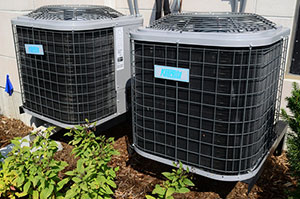AC Winter Shutdown Checklist
You Are Here: Home > Automatic Appliance Parts Blog > AC Winter Shutdown Checklist
*** Please be aware that Norridge is the only shipping facility. Inventory on-hand at all other branches is unavailable for immediate shipment. ***
Winters in the Chicago, Illinois, area are harsh, and shutting down your air conditioner properly can help protect it from cold weather and prevent costly damage from ice, snow, or rust. Following your HVAC manufacturer's recommendations can also help you keep your unit under warranty. That way, you won't need to pay for a repair or replacement. Here's a convenient checklist that you can use to deactivate your AC for winter.
Find Out What Type of HVAC Unit You Have
Many air conditioners look similar to heat pumps, but you shouldn't shut down a heat pump in winter. Heat pumps can provide heating as well as cooling. To find out what type of unit your home has, look at the model number, also called the M/N number, on the manufacturer's label or sticker. If it has the letters HP, it's a heat pump, and you should keep it running in winter.
Turn Off Your Air Conditioner
When you're ready to stop using your air conditioner for winter, change your thermostat from cooling to heating mode. If you have a smart thermostat, you can make this change from your smartphone. To keep anyone from accidentally turning the air conditioner on and to prevent it from turning on automatically, access the power circuit. It's usually inside a small box mounted on the side of your home near the air conditioner. Open the plastic or metal lid, and flip the switch to turn your air conditioner off.
You can also use your home's circuit-breaker box to cut power to your air conditioner. These precautions can help prevent electrocution while you work on your air conditioning unit. They can also keep condensation from accumulating inside an active unit on an unusually warm day; this condensation could then freeze and cause damage when the temperature drops at night.
Clean Your Outdoor Unit
Use a broom to remove leaves, twigs, and other debris on and around your air conditioner. You can also vacuum away debris with a soft brush attachment or wipe off the surface of your outdoor unit with a soft, damp cloth. Use a garden hose to remove bird droppings, dirt, dust, and dead bugs. Then, remove the cover and carefully clean the unit's fan. Make sure you don't bend or disconnect any of the wires. After you have sprayed off the fan and let it dry completely, reattach the unit's cover.
If possible, shut down your air conditioner on a sunny day to help get rid of any excess moisture. Look carefully in crevices for sticks, leaves, animal nests, and other debris. Also, look for cracks in the casing and any signs of rust. Make sure the seals are intact to prevent problems in the future.
Add Insulation
To keep parts of your air conditioner from freezing in winter, install foam covers to insulate any exposed pipes near your outdoor unit. You should cut the foam to fit the diameters and lengths of the pipes. You can wrap duct tape around the foam insulation to hold it in place.
Have Your Heater and Air Conditioner Checked by a Professional
Having your heating and cooling equipment inspected regularly by an HVAC technician can help keep everything working smoothly. You can find and repair any minor issues before they become more severe. Having your air conditioner checked before you shut it down in fall means you won't need to get it checked before you start using it in spring. You can have your heater checked at the same time, before you need to use it in winter.
Cover Your Air Conditioner
Covering your outdoor unit can protect it from debris, hail, icicles, and other hazards while you're not using it. You can choose a waterproof plastic or vinyl cover that's designed specifically for air conditioners, or you can use any covering that fits over the unit.
Keep it in position with vinyl ropes or bungee cords, and make sure it's fastened in place well to protect it from strong wind. However, there should still be enough ventilation to keep condensation from accumulating and causing rust. You can also place a piece of plywood over your outdoor HVAC unit. Make sure it has at least an extra 2 feet of overhang on all sides, and keep it in place with a few heavy bricks or rocks. For a more permanent air conditioner cover, you can construct an awning that hangs 2 or 3 feet above your unit all year.
Seal Wall Units
If you have a wall-unit air conditioner, you should seal it to keep cold air from coming into your home and raising your utility bills. Cover the vents on the inside, and use a cover on the outdoor part of your unit. You can use plastic sheets or tarps. For more insulation, use fabric as well, and make sure the sides and bottom of the unit are completely covered.
You can attach the fabric and plastic with bungee cords, vinyl rope, double-sided tape, or duct tape. To make the indoor part of your wall unit look more attractive in winter, hang a piece of artwork over it after you add the fabric and plastic.
Replace Your Air Filter
To keep your air conditioner in good condition, save energy, and prevent costly breakdowns, you should change your system's filter often. An air filter can help you avoid bad smells and allergy symptoms by catching pollen, pet dander, dust, and other contaminants. Changing your system's air filter when the seasons change prevents wear on your HVAC system as well, helping you avoid or delay a repair or replacement. The air filter is part of your air conditioner's indoor unit, and you can get a replacement at your local hardware store. The size you need should be printed on the front.
Check Your Outdoor Unit Often
Remove any snow, ice, branches, or other debris from your air conditioner's cover, and adjust the cover when needed. Also, look underneath your unit and remove any animals that may be living there or leaves that may have accumulated.
To learn more about maintaining your air conditioner and other appliances, contact us. We can help you find the parts you need at reasonable prices.

 Shopping Cart [empty]
Shopping Cart [empty]









